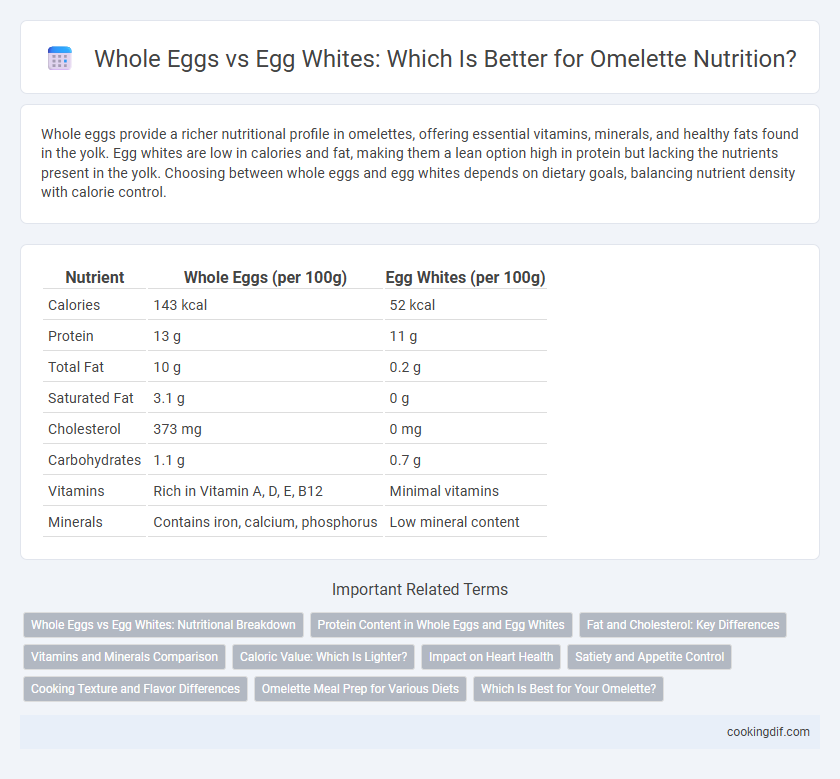Whole eggs provide a richer nutritional profile in omelettes, offering essential vitamins, minerals, and healthy fats found in the yolk. Egg whites are low in calories and fat, making them a lean option high in protein but lacking the nutrients present in the yolk. Choosing between whole eggs and egg whites depends on dietary goals, balancing nutrient density with calorie control.
Table of Comparison
| Nutrient | Whole Eggs (per 100g) | Egg Whites (per 100g) |
|---|---|---|
| Calories | 143 kcal | 52 kcal |
| Protein | 13 g | 11 g |
| Total Fat | 10 g | 0.2 g |
| Saturated Fat | 3.1 g | 0 g |
| Cholesterol | 373 mg | 0 mg |
| Carbohydrates | 1.1 g | 0.7 g |
| Vitamins | Rich in Vitamin A, D, E, B12 | Minimal vitamins |
| Minerals | Contains iron, calcium, phosphorus | Low mineral content |
Whole Eggs vs Egg Whites: Nutritional Breakdown
Whole eggs provide a balanced source of essential nutrients including high-quality protein, healthy fats, vitamins A, D, E, B12, and minerals like iron and selenium, all concentrated in both the yolk and white. Egg whites primarily offer a low-calorie, cholesterol-free protein source containing about 3.6 grams of protein per large egg with minimal fat and no vitamins or minerals found in the yolk. Choosing whole eggs for an omelette ensures a nutrient-dense meal rich in antioxidants and healthy fats, while egg whites focus solely on lean protein with reduced calories and cholesterol.
Protein Content in Whole Eggs and Egg Whites
Whole eggs contain about 6 grams of protein per large egg, with approximately half found in the egg white and the rest in the yolk, providing a complete amino acid profile essential for muscle repair and growth. Egg whites offer around 3.6 grams of protein per large egg and are virtually fat-free and cholesterol-free, making them a low-calorie option focused on protein content. Choosing whole eggs delivers higher overall nutrient density, while egg whites prioritize lean protein intake, ideal for those monitoring fat and cholesterol.
Fat and Cholesterol: Key Differences
Whole eggs contain approximately 5 grams of fat and 186 milligrams of cholesterol per large egg, contributing to higher calorie content and dietary cholesterol intake. Egg whites are virtually fat-free and contain no cholesterol, making them a heart-healthy option for omelette preparation. Choosing egg whites reduces saturated fat consumption while maintaining high protein levels essential for muscle repair and satiety.
Vitamins and Minerals Comparison
Whole eggs in omelettes provide a richer source of essential vitamins such as vitamin A, D, E, and B12, along with minerals like iron, phosphorus, and selenium, which are largely absent in egg whites. Egg whites offer high protein content with minimal calories and fat but lack the fat-soluble vitamins and most minerals found in the yolk. Choosing whole eggs enhances the nutritional profile with vital micronutrients crucial for immune function, bone health, and energy metabolism.
Caloric Value: Which Is Lighter?
Whole eggs contain approximately 70 calories each, with both the yolk and white contributing to the total caloric value, while egg whites alone have about 17 calories per egg, making them significantly lighter. The yolk holds most of the fat and calories, as well as essential nutrients like vitamins A, D, and E, whereas egg whites offer a high-protein, low-calorie option. Choosing egg whites for an omelette reduces caloric intake considerably, benefiting those focused on weight management or low-fat diets.
Impact on Heart Health
Whole eggs provide essential nutrients like vitamins A, D, E, and B12 along with healthy fats that support heart health. Egg whites are low in calories and cholesterol, making them a preferred option for reducing cardiovascular risk factors. Balancing whole eggs and egg whites in omelettes helps maintain nutrient intake while managing cholesterol levels for optimal heart health.
Satiety and Appetite Control
Whole eggs provide higher satiety and better appetite control compared to egg whites due to their intact fat and protein content, which slow digestion and promote fullness. Egg whites, although low in calories and high in protein, lack the fats that contribute to prolonged satiety signals. Including whole eggs in an omelette supports sustained energy levels and reduces overall calorie intake by curbing hunger more effectively.
Cooking Texture and Flavor Differences
Whole eggs in omelettes provide a rich, creamy texture with vibrant flavor due to the yolk's fat content, enhancing mouthfeel and taste complexity. Egg whites create a lighter, fluffier texture with a milder flavor, making them ideal for low-fat, high-protein diets without sacrificing volume. The choice between whole eggs and egg whites impacts omelette nutrition significantly, with whole eggs delivering more calories, healthy fats, and essential vitamins like A, D, and E.
Omelette Meal Prep for Various Diets
Whole eggs provide a balanced source of protein, healthy fats, and essential vitamins like B12 and D, making them ideal for nutrient-dense omelette meal prep. Egg whites offer a low-calorie, high-protein option preferred for low-fat or weight-loss diets but lack the fat-soluble vitamins found in yolks. Combining whole eggs with additional egg whites in omelettes allows customizable macronutrient profiles suitable for varied dietary goals such as bodybuilding, keto, or calorie-controlled meal plans.
Which Is Best for Your Omelette?
Whole eggs provide a balanced mix of high-quality protein, healthy fats, vitamins A, D, E, and B12, making them ideal for a nutrient-dense omelette. Egg whites are low in calories and fat while offering pure protein, suited for those prioritizing weight management or heart health. Choosing whole eggs or egg whites depends on your dietary goals, with whole eggs delivering a richer nutrient profile and egg whites supporting lean protein intake.
Whole eggs vs egg whites for omelette nutrition Infographic

 cookingdif.com
cookingdif.com